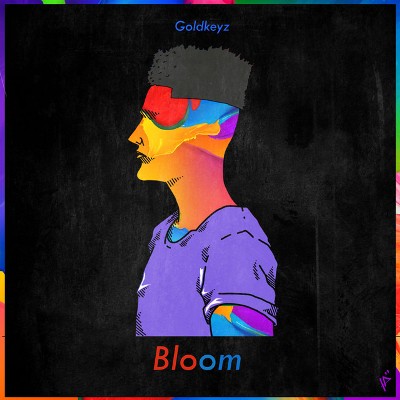No one can really describe what the vibe is, it’s a fairly abstract concept that can be tangible enough for anyone to understand, usually based off context. Commonly used in succinctly describing a lot of music by millennials, the term rarely ever gets abused, as it seems like an all-encompassing qualifier, but its efficacy varies from song to song and artist to artist, in a rather ineffable manner.
Goldkeyz’ music is the definition of a vibe – the affinity of his music to that designation is generous and absolute. Since his official introduction with Afrocentric, his 2016 debut tape, the producer has been honing his craft and cementing his status as a bohemian musical stylist with subsequent projects. While producers that are as far from ubiquity as Goldkeyz are often in a race to land placements on releases by artists in order to drum up attraction, there’s a preciousness to the reclusive strategy Keyz has adopted, using his own projects as his preferred mode of surfacing. Not only are the projects of worthwhile quality
Bloom, the producer’s latest LP and the follow-up to 2017’s Days Before Bloom EP, casts Goldkeyz, inevery aspect, as a stronger curator of vibes. In comparison to his previouswork, it’s his best body of work yet: Afrocentricis not as consistent and DBB is only halfas gripping.
Similar to the work of relative andclose collaborator Yinka Bernie, Goldkeyz seemingly flouts the relationshipbetween form and function, choosing to nestle the wide-ranging quality of hismusic vision into a distinct, difficult-to-overstate “vibe.” The distinctfeatures tying this subtly eclectic output being an affinity for atmospheric,mood setting piano chords and his preference for local percussions to keepthings African. For older listeners, these are constant features, but thedifference on Bloom is the tranquildrifting between influencing genres, achieved by composite production whereriffs and harmonies are combined in close proximity, like a sparsely decorated,highly sophisticated room.
This variedness highlightsGoldkeyz’ features into a superior beat maker, but what really highlights hispresence as a producer and curator is how the heterogeneity fits into thebroader scheme that is the album. The most identifiable moment on the album,and perhaps its most viscerally excitement, comes on “Bounce,” a radio readysong pairing Minz’ gliding melodies with Fasina’s hassle-free delivery over a catchy,midtempo afro-pop beat. While it would easily fit into a playlist of songs bypop heavyweights like Mr. Eazi and Tekno, the ethereal, trademark cool “Bounce”exudes is the reason it seamlessly fits into Bloom. The previously released single “Heartbreak Anonymous,” a gloomyneo-soul song featuring sullen, half-muttered vocals by Ogranya, followsclosely, and there’s no jarring effect from erratic pacing.
Over the course of his lastprojects, Goldkeyz has shown a strong acumen for recruiting guest artists intoperfect musical scenarios, and the intuition is even stronger on Bloom. There’s also a palpable level ofenthusiasm from each featured artist, as though they’d been waiting a while foran invitation to grace a Goldkeyz project: Joyce Olong’s soulful voice shinesthrough the glitzy arrangement of “Summer Fling;” Ouma’s radiant voice giveslucidity to her hippie musings on the dewy, afro-soul steeped “Fiery Tales;”D-Truce delivers two assured verse and a makeshift hook for “Cruise;” and YinkaBernie delivers a leisurely hook on “Jigga.”
The best case, though, forGoldkeyz’ symbiosis with an artist is rapper BarelyAnyHook. Appearing on fourof the album’s eleven songs with vocals, Barely justifies his pervasiveinclusion with striking performances each time behind the mic, so much so thata joint project with Goldkeyz looks like an enticing possibility. His ownmusic, as evidenced by his mixtape from last year, Took You Long Enough, mirrors his personal life and sometimes veersoff into heady territory, but the central conceit of his verses—blindinglyricism—is given unfettered room while working with Goldkeyz.
On “Hush,” a gentle love song featuringa tender beat, a magnificent hook by AYLØ and a verse reeking of infatuationby Musmah, Barely leads off with a verse so rich in colour and detail, it’squite baroque. Later, over the clanging percussions on “Cruise,” coming inafter two superb verses by D-Truce, Barely closes out with an absolute showboatof a verse, a montage of fatality moves packed with internal rhymes and assuredquotes (“I’m no Mr. Macho/but you’re no matchwhen it comes to skill”) in breakneck speed.
Elsewhere, on the titular track, Barely taps into the introspective candour of the song, again stealing the scene by matching the preoccupied tone of his 16 with majestic wordplay and a few pop culture references. “Bloom,” accentuated by languid, dour key and a sparse bounce, is clearly the album’s centrepiece, featuring a heart-filled performance from the suave and grounded Idris King, as well as pensive, strong verses from AT Merari and Ndigo. Placing Bloom in the context of its title track, the album is a compilation of feelings bathed in the glow of youth, from swagger talk (“Jigga” “Cruise”), to the sometimes convoluted exigencies of lust and love (“Summer Fling” “Smooth Lover”), and the necessary task of self-discovery (“Fiery Tales” “Bloom”).
Where Bloom falters is the overall sound of the project. It doesn’t soundcruddy, far from, but it doesn’t sound plush either. The positive takeaway isthat Goldkeyz engineers the album in such a way that it sounds like he toes theline between raw and exquisitely rough, flipping the DIY effect into somethingvery durable. It also helps that the album comes with canny sequencing, leavingno room for lags in its near hour play time. On briskly getting the outro, areprise of the instrumental scoring the intro track “Run to the City,” itbecomes recognizable, and clearer with repeat listens, that Goldkeyz, althoughwordless, has been the loudest contributor all along.


